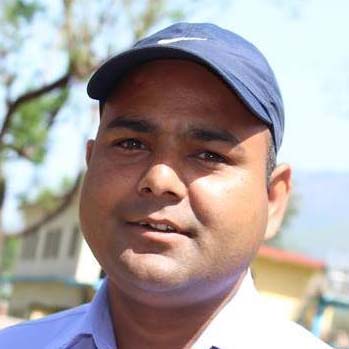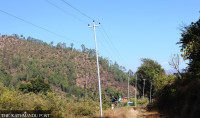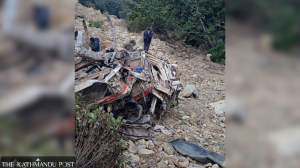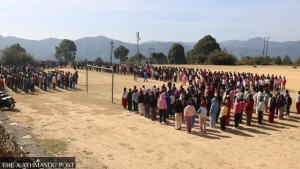Karnali Province
Thousands of Karnali youths compelled to migrate to India for livelihood
Finding a young man in the village who has not migrated to India is almost impossible.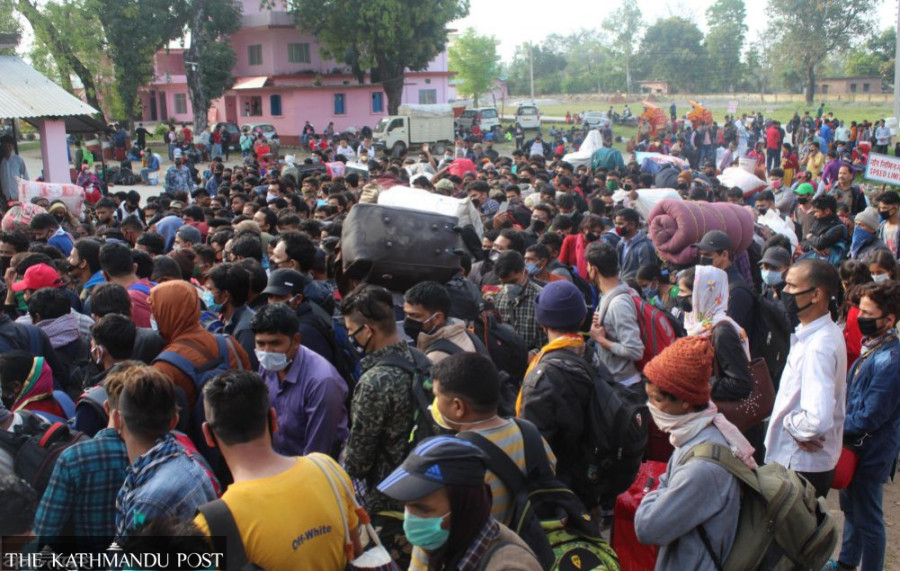
Krishna Prasad Gautam
Every year after the festive season, villages across Karnali Province witness an exodus of young men leaving for India to work as labourers. This seasonal migration, driven by chronic poverty and the lack of local employment opportunities, has left many villages desolate, populated primarily by women, children, and the elderly.
The 2021 National Census reveals a grim reality for Karnali: out of its population of 1.69 million, over 442,000 people—roughly 26 percent—are working in India. Despite billions being allocated annually to employment programmes by the provincial and federal governments, the initiatives have shown little impact, forcing families to rely on remittances to survive.
Villages left behind
There are approximately 700 households in wards 9 and 10 of Chaukune Rural Municipality of Surkhet district. Most of them belong to the Dalit community. Finding a young man in the village who has not migrated to India is almost impossible.
“Most families can sustain themselves only for three months on the crops they grow,” said Basanta Dhamala, a teacher at a local school. “Since there are no jobs in the village, up to five men from each household migrate to India. Women and children are left to take care of the home and community.”
This year, around 500 youths who had returned to celebrate Dashain and Tihar left again just a week after the festivals, travelling via Nepalgunj in seven reserved buses. Their destination: Indian cities where they will work as labourers, security guards, or porters.
Development stalled by labour shortages
The absence of young men has also hindered local development. According to Ward Chairperson Kabiram Khanal, ongoing infrastructure projects, such as bridges over the Karnali and Bheri rivers worth Rs1.5 billion, have struggled due to a lack of local workers.
“We have to rely on labourers from Tarai or India,” said Khanal. “Most of the other projects are dependent on senior citizens and women available in the villages. Despite implementing self-employment programmes, we haven’t been able to retain our youths.”
The problem is compounded by frequent crop destruction caused by wild animals. “If wild animals don’t destroy the crops, we get to harvest them. Otherwise, we rely on the money sent by family members working in India,” said Krishna Bahadur BK, an elderly resident of Chaukune.
Although electricity poles have been installed in the village, power lines are yet to be connected. Similarly, despite living near the Karnali and Bheri rivers, residents face severe drinking water shortages, often relying on muddy river water.
The scale of migration
Kalikot’s Mahawai Rural Municipality presents a similar story. Ward Chairperson Bhim Bahadur Sarki, who supports a family of nine, said they rely entirely on his income from India. “If I don’t go to India, my family will starve,” he said.
Sarki, like many others, travels to India twice a year, leaving after Dashain and returning in time to harvest wheat in March. This year, he and 46 other men from his village departed for India last Sunday via Surkhet.
“Whatever we earn during the festival season is spent on celebrations,” Sarki explained. “Now we must return to India to save enough for the next harvest. There’s simply no work in the village, and relying on loans isn’t sustainable.”
Around 7,000 residents of Mahawai Rural Municipality alone migrate to India each year, according to Khem Bahadur Singh, chairman of the rural municipality. Across Kalikot district, the District Coordination Committee estimates that over 40,000 people seek employment in India annually.
Government programmes fail to deliver
Despite the gravity of the situation, employment programmes in Karnali have failed to yield tangible results. The provincial government allocated Rs1.16 billion this year for the Chief Minister’s Employment Programme, aimed at providing jobs for at least 16,000 people. However, the scheme has faced criticism for being ineffective and poorly implemented.
Since its launch, the programme has spent Rs7.5 billion, reportedly creating 4.5 million workdays, according to the Office of the Chief Minister and Council of Ministers. Yet, officials admit that precise data on beneficiaries is unavailable, highlighting a lack of oversight and accountability.
“We disburse funds to local governments and infrastructure offices,” said Anand Saru, secretary at the office of the chief minister. “However, no consolidated data has been collected to measure the programme’s impact. We plan to make the process more effective this year.”
The Prime Minister’s Employment Programme, which also operates in the region, suffers from similar inefficiencies. Employment plans are often approved late, leaving job-seekers with only a few weeks of work before funds run out.
“The funding for these programmes is frequently delayed until the end of the fiscal year,” said Ratna Bahadur Khadka, mayor of Nalgad Municipality in Jajarkot. “As a result, we can only provide employment for a month or less. Moreover, politically motivated allocations further reduce the programme’s effectiveness.”
The human cost
The continuous migration of young men has transformed social structures in Karnali’s villages. Women have become the backbone of their communities, managing households, raising children, and even participating in development projects.
“My husband works in India for nine months a year, returning only for planting season and festivals,” said Pampha BK of Lekbesi Municipality-8. “Until he comes back, I have to handle everything on my own, including household chores and community responsibilities.”
For many, India is not a choice but a compulsion. The families who can’t afford to send members to Gulf countries like Qatar, Saudi Arabia, or Malaysia are left with no option but to rely on Indian wages.
“It’s heartbreaking to see our villages empty out after the festivals,” said Durga Prasad Sapkota, a community leader. “Even for funerals, it’s hard to find enough men to carry the deceased. Entire villages are becoming ghost towns.”
A bleak future
The broader issue lies in systemic failures to create sustainable employment opportunities. Karnali Province’s unemployment rate stands at 9.7 percent. Of the 514,818 Karnali residents engaged in foreign employment, 86 percent work in India, primarily in low-paying and physically demanding jobs.
Many local leaders blame a lack of foresight and planning. “When local governments were introduced under the three-tier federal system, people hoped for job creation and economic growth,” said Sapkota. “Instead, poor governance and rising taxes have made life even harder for the poor.”
As Karnali’s youth continue to migrate to India in droves, their absence leaves a void that development programmes have yet to fill. Without meaningful reform and investment, the cycle of migration and poverty seems destined to continue.




 18.12°C Kathmandu
18.12°C Kathmandu